新标准外研社八年级上册M1四时态
- 格式:doc
- 大小:37.50 KB
- 文档页数:2
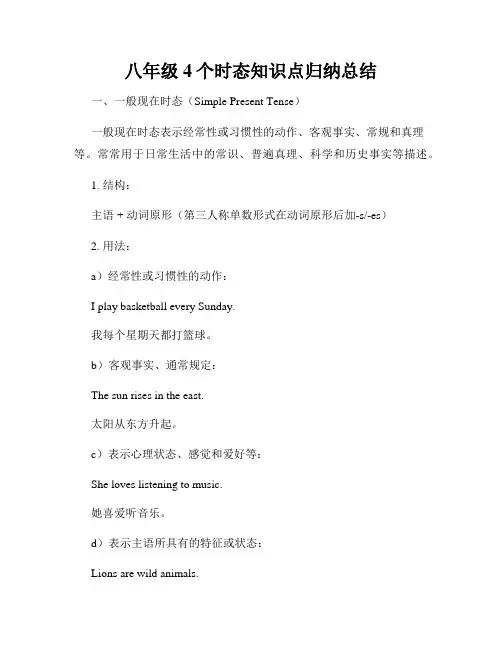
八年级4个时态知识点归纳总结一、一般现在时态(Simple Present Tense)一般现在时态表示经常性或习惯性的动作、客观事实、常规和真理等。
常常用于日常生活中的常识、普遍真理、科学和历史事实等描述。
1. 结构:主语 + 动词原形(第三人称单数形式在动词原形后加-s/-es)2. 用法:a)经常性或习惯性的动作:I play basketball every Sunday.我每个星期天都打篮球。
b)客观事实、通常规定:The sun rises in the east.太阳从东方升起。
c)表示心理状态、感觉和爱好等:She loves listening to music.她喜爱听音乐。
d)表示主语所具有的特征或状态:Lions are wild animals.狮子是野生动物。
二、一般过去时态(Simple Past Tense)一般过去时是表示过去某个时间或某时期内发生的动作或存在的状态。
1. 结构:主语 + 动词的过去式2. 用法:a)表示过去的动作或状态:He visited his grandparents last week.上周他去看望了他的祖父母。
b)表示过去的习惯或状态:She lived in Beijing when she was young.她年轻时住在北京。
c)表示过去的真理或规律:Newton discovered the law of gravity.牛顿发现了万有引力定律。
d)虚拟语气中的过去时(如果条件从句是虚拟语气,主句也需要用虚拟语气):If I were you, I would study harder.如果我是你,我会更加努力学习。
三、现在进行时态(Present Continuous Tense)现在进行时表示说话时或现阶段正在进行的动作。
1. 结构:主语 + am/is/are + 现在分词2. 用法:a)表示现在(说话时)正在进行的动作:I am reading a book.我正在看书。

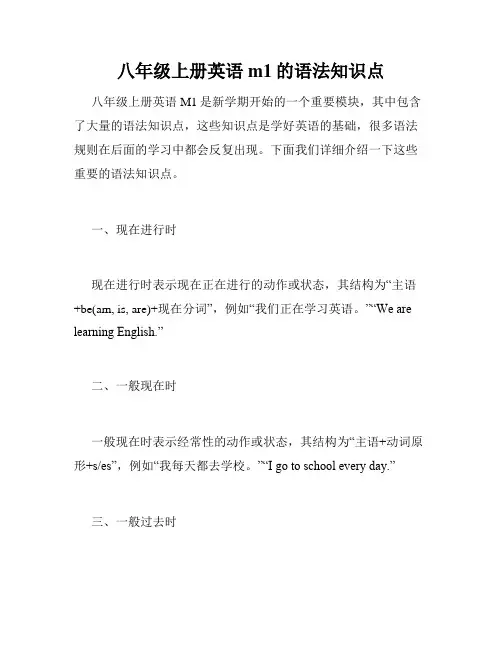
八年级上册英语m1的语法知识点八年级上册英语M1是新学期开始的一个重要模块,其中包含了大量的语法知识点,这些知识点是学好英语的基础,很多语法规则在后面的学习中都会反复出现。
下面我们详细介绍一下这些重要的语法知识点。
一、现在进行时
现在进行时表示现在正在进行的动作或状态,其结构为“主语+be(am, is, are)+现在分词”,例如“我们正在学习英语。
”“We are learning English.”
二、一般现在时
一般现在时表示经常性的动作或状态,其结构为“主语+动词原形+s/es”,例如“我每天都去学校。
”“I go to school every day.”
三、一般过去时
一般过去时表示过去某个时刻或一段时间内所发生的动作或状态,其结构为“主语+动词过去式”,例如“昨天我看了一部电影。
”“Yesterday I watched a movie.”
四、现在完成时
现在完成时表示过去发生的动作对现在的影响或结果,其结构为“主语+have/has+过去分词”,例如“我已经完成了作业。
”“I have fin ished my homework.”
五、一般将来时
一般将来时表示将要发生的动作或状态,其结构为“主语+will+动词原形”,例如“明天我将会去上学。
”“I will go to school tomorrow.”
六、情态动词
情态动词有can、could、may、might、must等,表示能力、请求、建议、推测等不同的意义。
它们的用法比较灵活,请注意。
以上就是八年级上册英语M1的主要语法知识点,希望同学们能够认真学习,并在后续的英语学习中逐步熟练掌握。
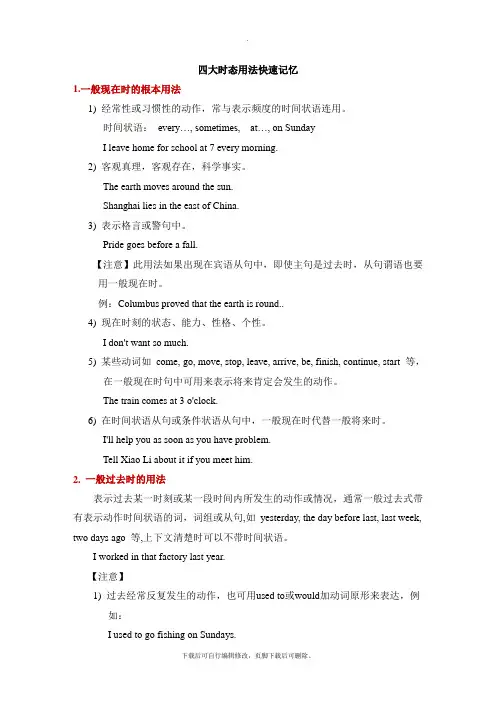
四大时态用法快速记忆1.一般现在时的根本用法1) 经常性或习惯性的动作,常与表示频度的时间状语连用。
时间状语:every…, sometimes,at…, on SundayI leave home for school at 7 every morning.2) 客观真理,客观存在,科学事实。
The earth moves around the sun.Shanghai lies in the east of China.3) 表示格言或警句中。
Pride goes before a fall.【注意】此用法如果出现在宾语从句中,即使主句是过去时,从句谓语也要用一般现在时。
例:Columbus proved that the earth is round..4) 现在时刻的状态、能力、性格、个性。
I don't want so much.5) 某些动词如come, go, move, stop, leave, arrive, be, finish, continue, start 等,在一般现在时句中可用来表示将来肯定会发生的动作。
The train comes at 3 o'clock.6) 在时间状语从句或条件状语从句中,一般现在时代替一般将来时。
I'll help you as soon as you have problem.Tell Xiao Li about it if you meet him.2. 一般过去时的用法表示过去某一时刻或某一段时间内所发生的动作或情况,通常一般过去式带有表示动作时间状语的词,词组或从句,如yesterday, the day before last, last week, two days ago 等,上下文清楚时可以不带时间状语。
I worked in that factory last year.【注意】1) 过去经常反复发生的动作,也可用used to或would加动词原形来表达,例如:I used to go fishing on Sundays.2) “used to〞也可用于表示过去曾经存在过的状态。
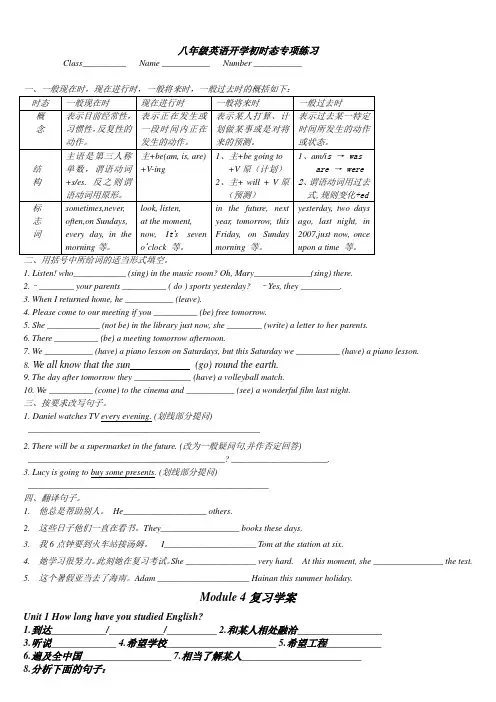
八年级英语开学初时态专项练习Class__________ Name ___________ Number ___________1. Listen! who____________ (sing) in the music room? Oh, Mary_____________(sing) there.2.–________ your parents __________ ( do ) sports yesterday? –Yes, they _________.3. When I returned home, he ___________ (leave).4. Please come to our meeting if you __________ (be) free tomorrow.5. She ____________ (not be) in the library just now, she ________ (write) a letter to her parents.6. There __________ (be) a meeting tomorrow afternoon.7. We ___________ (have) a piano lesson on Saturdays, but this Saturday we __________ (have) a piano lesson.8.We all know that the sun _______ (go) round the earth.9. The day after tomorrow they _____________ (have) a volleyball match.10. We __________ (come) to the cinema and ___________ (see) a wonderful film last night.三、按要求改写句子。
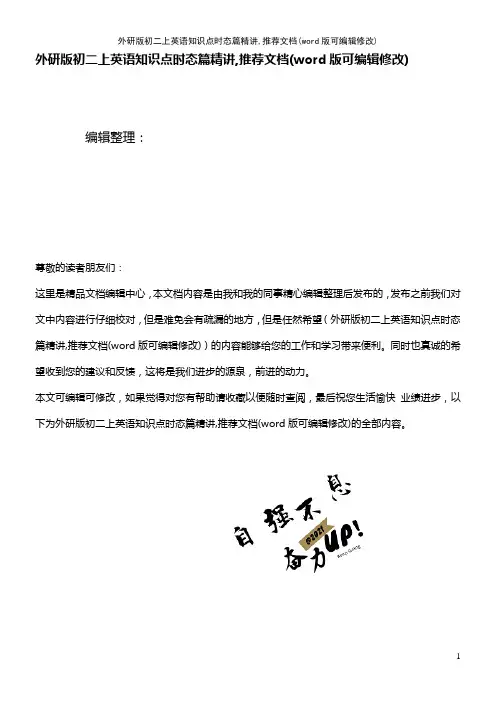
外研版初二上英语知识点时态篇精讲,推荐文档(word版可编辑修改) 编辑整理:尊敬的读者朋友们:这里是精品文档编辑中心,本文档内容是由我和我的同事精心编辑整理后发布的,发布之前我们对文中内容进行仔细校对,但是难免会有疏漏的地方,但是任然希望(外研版初二上英语知识点时态篇精讲,推荐文档(word版可编辑修改))的内容能够给您的工作和学习带来便利。
同时也真诚的希望收到您的建议和反馈,这将是我们进步的源泉,前进的动力。
本文可编辑可修改,如果觉得对您有帮助请收藏以便随时查阅,最后祝您生活愉快业绩进步,以下为外研版初二上英语知识点时态篇精讲,推荐文档(word版可编辑修改)的全部内容。
外研版初二上英语知识点时态篇一.主要时态1.当有always,usually,often,sometimes,seldom,never,once a,every时用一般现在时态。
时态构成:Be动词或行为动词主语为第三人称单数时:动词用第三人称单数式(is、has、v+s/es);主语为一、二人称时动词用原形。
否定形式:be动词(am、is、are)+not行为动词前+don't主语为第三人称单数+doesn’t同时把行为动词还原成原形形式一般疑问句:be提前2.当有now,at the moment,look,listen时用现在进行时态。
时态构成:Be(am,is ,are)+v-ing3.当有Tomorrow,the day after tomorrow,from now on,in+一段时间,some day,next时用一般将来时态.时态构成为:will+v。
或be going to+v。
4.当有yesterday,...。
..ago,last..。
.。
,just now。
....。
用一般过去时时态构成:v。
+ed二.重要时态1.一般现在时:时态含义:表示经常性、习惯性的动作、状态。
时态使用场合:(1)表示经常习惯的行为状态Nick doesn’t do his homework on Sundays。
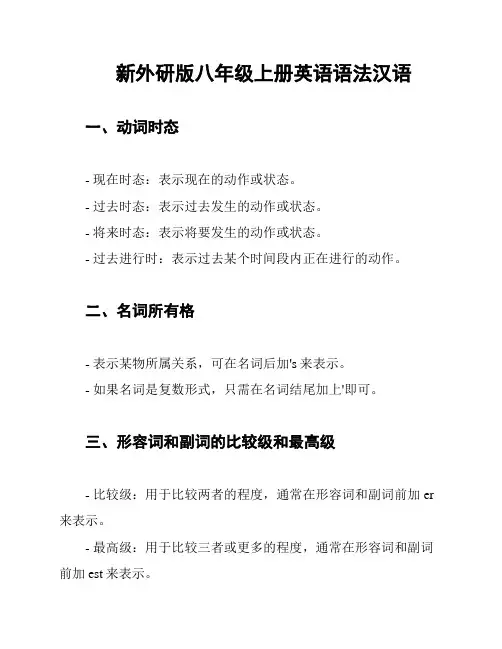
新外研版八年级上册英语语法汉语
一、动词时态
- 现在时态:表示现在的动作或状态。
- 过去时态:表示过去发生的动作或状态。
- 将来时态:表示将要发生的动作或状态。
- 过去进行时:表示过去某个时间段内正在进行的动作。
二、名词所有格
- 表示某物所属关系,可在名词后加's来表示。
- 如果名词是复数形式,只需在名词结尾加上'即可。
三、形容词和副词的比较级和最高级
- 比较级:用于比较两者的程度,通常在形容词和副词前加er 来表示。
- 最高级:用于比较三者或更多的程度,通常在形容词和副词前加est来表示。
四、不定代词
- 指代不确定的人或事物,如some,any,no等。
五、情态动词
- 可用于表示能力、可能性、允许与否等,如can,could,may,might,must,shall,should等。
六、定语从句和状语从句
- 定语从句:用来修饰一个名词或代词,通常以关系词who,which,that引导。
- 状语从句:用来表示时间、地点、原因、条件等,通常以关
系词when,where,why,if引导。
七、虚拟语气
- 用来描述与事实相反或不可能实现的情况,通常使用should,were等。
八、反意疑问句
- 用于在陈述句后加上一句疑问句表示询问、确认、邀请等。
以上是新外研版八年级上册英语语法汉语的内容,希望对您有
帮助!。
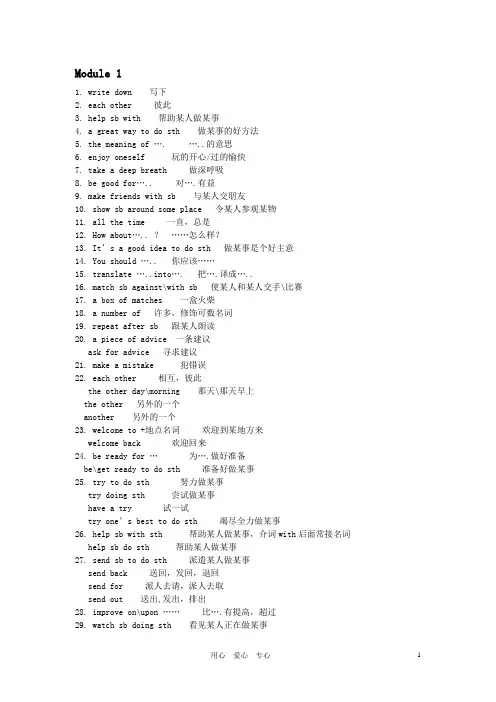
Module 11. write down 写下2. each other 彼此3. help sb with 帮助某人做某事4. a great way to do sth 做某事的好方法5. the meaning of …. …..的意思6. enjoy oneself 玩的开心/过的愉快7. take a deep breath 做深呼吸8. be good for….. 对….有益9. make friends with sb 与某人交朋友10. show sb around some place 令某人参观某物11. all the time 一直,总是12. How about….. ?……怎么样?13. It’s a good idea to do sth 做某事是个好主意14. You should ….. 你应该……15. translate …..into…. 把….译成…..16. match sb against\with sb 使某人和某人交手\比赛17. a box of matches 一盒火柴18. a number of 许多,修饰可数名词19. repeat after sb 跟某人朗读20. a piece of advice 一条建议ask for advice 寻求建议21. make a mistake 犯错误22. each other 相互,彼此the other day\morning 那天\那天早上the other 另外的一个another 另外的一个23. welcome to +地点名词欢迎到某地方来welcome back 欢迎回来24. be ready for …为….做好准备be\get ready to do sth 准备好做某事25. try to do sth 努力做某事try doing sth 尝试做某事have a try 试一试try one’s best to do sth 竭尽全力做某事26. help sb with sth 帮助某人做某事,介词with后面常接名词help sb do sth 帮助某人做某事27. send sb to do sth 派遣某人做某事send back 送回,发回,退回send for 派人去请,派人去取send out 送出,发出,排出28. improve on\upon ……比….有提高,超过29. watch sb doing sth 看见某人正在做某事30. take a deep breath 深深吸一口气hold your breath 闭气,屏气out of breath 喘不上气31. remember sb to sb 代某人向某人问好remember to do sth 记住去做某事(事情还未做过)remember doing sh 记住已经做过某事(事情已经做过)40. forget sb\sth 忘记某人,某物forget to do sth 忘记要做某事forget doing sth 忘记曾经做过某事41. wish sb sth 祝福\祝愿某人某事wish to do sth 表示在主观上强烈希望做某事42. It takes a long time to do sth 花费了很长时间去做某事43. How long does\did it take…..? 询问做某事需要花费多长时间44. find it +形容词+to do sth 发现做某事….45. hear sb doing sth 听见某人正在做某事hear sb do sth 听见某人做某事46. Why don’t you do …..=Why not you do……. 为什么不呢47. It is +形容词+(for sb )to do sth (对某人来说)做某事是….48.Why don’t you write it down? 你们为什么不把它记下来呢?49. It’s a good idea to check your vocabulary notebook every day. 每天都检查你的词汇笔记本是一个好主意。
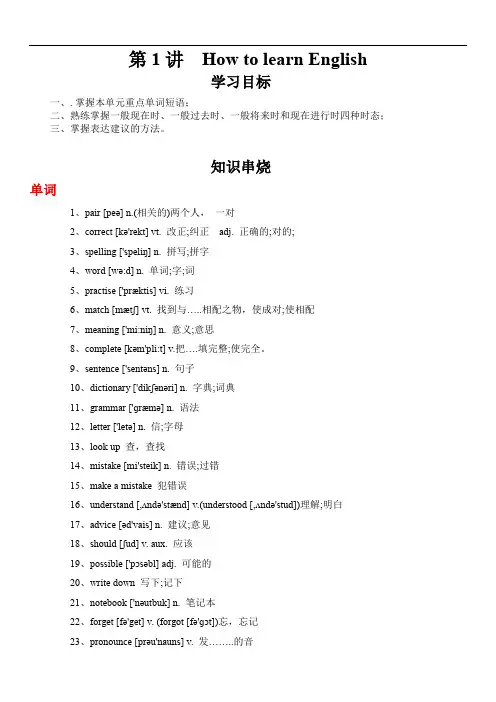
第1讲How to learn English学习目标一、.掌握本单元重点单词短语;二、熟练掌握一般现在时、一般过去时、一般将来时和现在进行时四种时态;三、掌握表达建议的方法。
知识串烧单词1、pair [peə] n.(相关的)两个人,一对2、correct [kə'rekt] vt. 改正;纠正adj. 正确的;对的;3、spelling ['speliŋ] n. 拼写;拼字4、word [wə:d] n. 单词;字;词5、practise ['præktis] vi. 练习6、match [mætʃ] vt. 找到与…..相配之物,使成对;使相配7、meaning ['mi:niŋ] n. 意义;意思8、complete [kəm'pli:t] v.把….填完整;使完全。
9、sentence ['sentəns] n. 句子10、dictionary ['dikʃənəri] n. 字典;词典11、grammar ['ɡræmə] n. 语法12、letter ['letə] n. 信;字母13、look up 查,查找14、mistake [mi'steik] n. 错误;过错15、make a mistake 犯错误16、understand [,ʌndə'stænd] v.(understood [,ʌndə'stud])理解;明白17、advice [əd'vais] n. 建议;意见18、should [ʃud] v. aux. 应该19、possible ['pɔsəbl] adj. 可能的20、write down 写下;记下21、notebook ['nəutbuk] n. 笔记本22、forget [fə'get] v. (forgot [fə'ɡɔt])忘,忘记23、pronounce [prəu'nauns] v. 发……..的音24、aloud [ə'laud] adv. 大声地;出声地25、radio ['reidiəu] n.电台,广播26、pronunciation [prəu,nʌnsi'eiʃən] n. 发音27、key [ki:] adj. 关键行动,非常重要的28、main [mein] adj. 主要的,最大的29、excellent ['eksələnt] adj. 极好的;极好的30、agree [ə'ɡri:] vt. 同意;赞同31、agree with sb. 同意某人32、vocabulary [vəu'kæbjuləri] n. 词汇;词汇量33、ask for 请求(给予)34、improve [im'pru:v] vt. 改善,改进35、basic ['beisik] adj. 主要的;基础的36、time [taim] n. 回;次37、advise [əd'vaiz] vt.向…..提出意见; 建议;忠告38、shy [ʃai] adj. 害羞的;腼腆的39、conversation [,kɔnvə'seiʃən] n. 交谈;谈话40、quickly ['kwikli] adv. 迅速地;快地41、natural ['nætʃərəl] adj. 合理的;合乎常情的42、suggest [sə'dʒest] vt. 提议,建议43、place [pleis] vt. 放置课文Unit1Let’s try to speak English as much as possible.Ms James:Welcome back,everyone!Today,we’re going to talk about good ways to learn English.Ready? Who has some advice?Lingling:We should always speak English in class.Ms James:Good!Let’s try to speak English as much as possible.Daming:Why not write down the mistakes in our notebooks?Ms James:That’s a good idea.And don’t forget to write down the correct answers next to the mistakes.Wha t else?Lingling:It’s a good idea to spell and pronounce new words aloud every day.Ms James:Thanks a lot,Lingling.How about listening to the radio?Lingling:Yes,that’s good for our pronunciation too.But there are so many new word.Ms James:You don’t need to understand every word.You just need to listen for key words and main ideas.Daming:That’s the same for reading.English stories are so interesting.I get to know a lot about the world th rough reading.Lingling:I think writing is also important.Why don’t we try to find some English pen friends?We can write to them.Ms James:Excellent!I agree with you.Unit2You should smile at her!Send your questions to Diana,the Language Doctor.Many students ask for advice about how to improve their English.Here are three basic questions.The first question is about understanding English films and songs.Li Hao from Hubei wrote,“I like wa tching English films and listening to English songs,but I can only understand a little.What can I do?”Watching films and listening to songs are great way to learn English!Watch and listen several times,and guess the meaning of the new words.Each time you will learn something new.I also advise you to talk abou t the films or songs with your friends.The second question is about speaking.Wang Fan from Jilin wrote,“Our school has a teacher from the U S.I am shy and I am afraid to speak to her.What should I do?”You can say,“Hello!How are you?”“Do you like China?”These are good ways to start a conversation.And before you begin,you should smile at her!Remember this:Do not be shy.Just try.The third question is about vocabulary.Zhang Lei from Anhui wrote,“I write down new words,but I forget them quickly.How can I remember them?”Do not worry.It is natural to forget new words!I suggest you write four or five words a day on pieces of pap er and place them in your room.Read the words when you see them,and try to use them.语法1. When you don’t know a word, you can _____ in the dictionary.A. look it upB. set it upC. give it upD. pick it up2. Remember _______ your personal information to strangers. It's dangerous.A. to tellB. not to tellC. not tell3. There is ______ in today’s newspaper.A. something importantB. important somethingC. anything importantD. important anything4. I have some problems with my English writing. Can you give me some________?A. adviceB. decisionsC. informationD. messages解析:1.A. 一般代词it要放中间look it up, 名词可放中间也可放后面2.A. remember to do sth 记得做某事(还未做)3.A.形容词修饰不定代词要后置4.A.advice是不可数名词当堂总结一.重点短语1.as much/many as possible尽可能多2.It’s adj for sb to do sth对某人来说做某事很……3.Welcome back 欢迎回来4.talk about谈论关于5.how to do sth如何做某事6.have some advice有一些建议7.make a mistakes 犯错误8.forget to do sth忘记还没做某事forget doing sth忘记已经做过某事9.around the world 全世界10.it’s a good idea to do做某事是个好主意11.as much as possible尽可能多12.how/what about doing sth做某事怎么样13.listen to the radio听收音14.take sb around带领某人参观15.main idea主要大意16.=invite sb to sp邀请某人去某地17.write to sb写信给某人18.agree to do sth同意做某事19.agree with sb同意某人20.why don’t sb do sth=why not do sth为什么不做事21.write down写下22.ask for征求,寻求23.basic questions基本问题lions of数以百万的25.several times几次26.all the time 一直27.advise sb to do sth建议某人做某事28.be afraid of doing/sth害怕做某事/害怕某事be afraid to do sth害怕做某事29.key words 关键词30.smile at sb对某人微笑31.forget them quickly很快就忘了他们32. be good at sth/doing sth擅长某事、擅长做某事33.a piece of paper一张纸34.try to do尝试做(不强调成功)35.try doing尝试做(强调成功)36.remember to do sth记得还未做某事37.remember doing sth记得做过某事二.重点句子1.提建议的句子We should always speak English in class. 我们应该在课堂上一直讲英语。
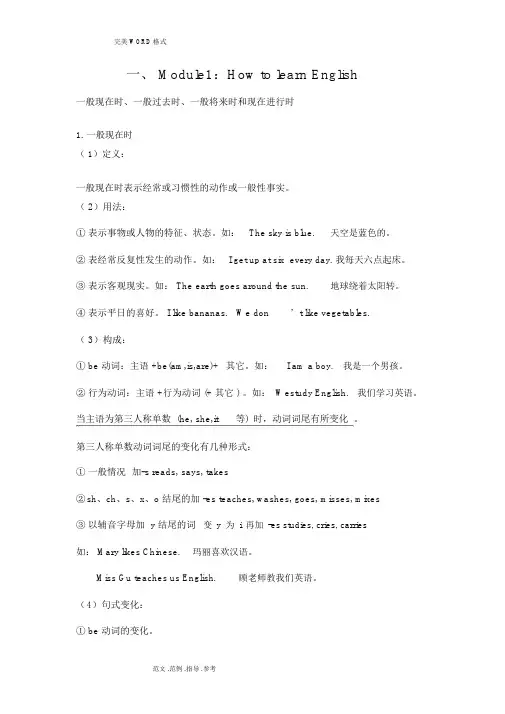
一、 Module1:How to learn English一般现在时、一般过去时、一般将来时和现在进行时1.一般现在时( 1)定义:一般现在时表示经常或习惯性的动作或一般性事实。
( 2)用法:①表示事物或人物的特征、状态。
如:The sky is blue.天空是蓝色的。
②表经常反复性发生的动作。
如:I get up at six every day. 我每天六点起床。
③表示客观现实。
如: The earth goes around the sun.地球绕着太阳转。
④表示平日的喜好。
I like bananas. We don’t like vegetables.( 3)构成:① be 动词:主语 +be(am,is,are)+其它。
如:I am a boy.我是一个男孩。
②行为动词:主语 +行为动词 (+ 其它 ) 。
如:Westudy English.我们学习英语。
当主语为第三人称单数 (he, she,it等)时,动词词尾有所变化。
第三人称单数动词词尾的变化有几种形式:①一般情况加-s reads, says, takes②sh、ch、s、x、o 结尾的加 -es teaches, washes, goes, misses, mixes③以辅音字母加 y 结尾的词变y为i再加-es studies, cries, carries如: Mary likes Chinese.玛丽喜欢汉语。
Miss Gu teaches us English.顾老师教我们英语。
(4)句式变化:① be 动词的变化。
否定句:主句 +be+not+其它。
如:He is not a worker.他不是工人。
一般疑问:Be+主语 +其它。
如: -Are you a student?-Yes ,I am. / No,I’m not.特殊疑问句:特殊疑问词 +一般疑问句。
如: Where is my bike?② 行为动词的变化。
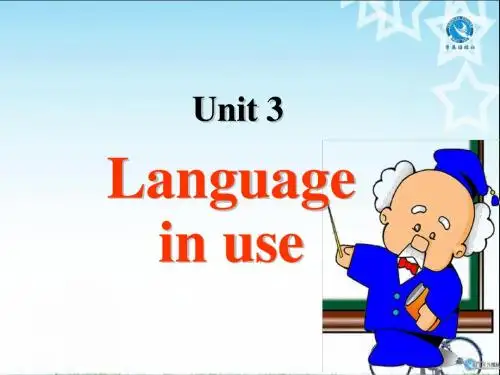
M1 一般现在时、一般过去时、一般将来时、现在进行时一般过去时的用法一、概念1.表示在的过去某个时间里所发生的动作或存在的状态。
时间状语有:yesterday, last week, an hour ago, in 1982等。
如:1)I was at the zoo yesterday. 昨天我在动物园。
2)I went to bed at eleven last nigth. 昨晚我11:00睡觉。
2.表示在过去一段时间内,经常性或习惯性的动作。
1)When I was a child, I often played football in the street.我在小的时候,我经常在街道上踢足球。
2)My father often drove to work last year. 去年,我爸爸经常开车上班。
二、句子结构1.在表示某个时间里存在的状态的句子,系动词用过式was,were构成。
如:(1)I was at home yesterday.昨天我在家。
(2)We were in the gym just now. 刚才我们在体育馆。
2.在表示过去某个时间里发生的动作,用动词的过去式构成。
如:I visited my uncle yesterday. 昨天我拜访了我的叔叔。
3.各种句式(1)一般过去时的肯定陈述句:主语+动词过去式+宾语或表语。
He worked in Shanghai ten years ago.(2)一般过去时的否定句:a.主语+didn’t +动词原形+宾语。
(did + not = didn't)He didn't do morning exercises yesterday.b.主语+w asn’t/weren’t +表语。
(was + not = wasn't were + not = weren't)He wasn't an English teacher ten years ago.(3)一般过去时的一般疑问句:a.Did +主语+动词原形+宾语?Did you study English in 1990 ?b.Was/Were+ 主语+表语?Was he a pupil five years ago ?(4)一般过去时的特殊疑问句:a.特殊疑问词+did + 主语+动词原形+宾语?Where did your parents live five years ago?What did you do last Sunday?b.特殊疑问词+were/was +表语?Who was at the zoo yesterday三、时间特征在一般过去时句子中,通常与下列表示过去的时间状语连用:yesterday, yesterday morning, yesterday afternoon, yesterday evening, the day before yesterday(前天), last night, last week, last month, last year, a moment ago(刚才), just now(刚才), two days ago, a week ago, in 1990,…四、动词过去式的构成规律(一)规则动词的过去式1.一般情况下,在动词原形后面加-ed。
新课标解读八年级英语上册(外研版)Module 1 How to learn EnglishI Words:pair correct spelling word practise match meaning completedictionary grammar letter mistake understand advice should possible notebook forget pronounce aloud radio pronunciation key main excellentagree basic time advise shy conversation quickly natural suggest placeII Phrases:Look up make a mistake write down agree with sb.ask forIII Grammar 一般现在时New Standard 一般过去时P47(6)时态一般将来时现在进行时IV Topic: Talk about the good ways of learning EnglishNew standard P96 5.(19) Shool activityModule 2 My hometown and my countryI Wordshill popultion wide pretty than get north south westespecially island low countryside umbrella hometownII Phrases:pretty good be famous forIII Grammar: New standard for P47.6①Comparative adjectives (-er)②本模块也出现了形容词的同级比较句型,标识为as...as...否定形式:not so/as...as IV Topic: New standard P95.3 (Living envirment)Introduce your hometown and compare two places in you hometown中考题〔2011〕31 We’ll have dinner at Qianxilong Restaurant,which is famous-its foodA.ofB.toC.forD.asModule3 SportsI Words:baseball volleyball boring exciting relaxing already matter hurt enjoyableOlympics miss mind plenty beat careless coach against train practicewarm usual pleased pass pity chance loudlyII PhrasesWhat’s the matter? plenty of cheer...on... warm upIII Grammar: New standard P47 6.7Comparatire adjectiver(more); adverbs and comparative adverbs(-er,more);Irregular comparatives.IV Topic:New standard P97 16(56)sport and matchesTalk about a sport中考题:〔2011〕27.Some students are______that they often make mistakes in their hometownA.carfulB.seriousC.carelessD.successful〔2013〕27.The baby is sleeping please speak______.A.Loudly B.clearly C.quietly D.politelyModule 4 Planes ships and trainsI words:road excep choice classmate far close journey book parkoutside homever costII Phrases:far from all the timeIII Grammar:New standard P47 6.7Superlative adjectives and adverbs (-est,most)Irregular superlativesV Talk about something about a family trip to a city中考题:〔2011〕29 一I’m going to Hainan woith my aunt for my holiday after the exam一_______A.have a good timeB.It doesn’t matterC.You are welcomeD.Thanks a lot.Module5 Lao she’s Teahouse1.新课标要求掌握的单词Actress offer end act show common twentieth describe society college name if magic2.新课标要求掌握词汇的拓展短语In the end no idea be famous for give a warm welcome to take place3.新课标本模块要求的语法动词不定式作宾语和双宾语结构4.话题项目新课标对应24故事与诗歌本模块以老舍茶馆为主线,用对话,短文等形式介绍了老舍,老舍茶馆以及话剧《茶馆》等内容。
一般现在时、一般将来时、一般过去时、现在进行时知识总结一、一般现在时一般现在时表示经常性或习惯性的动作,常与表示频度的时间状语连用,如often, usually, always, sometimes, never, seldom, every week/day/year/month..., once a week, on Sundays第三人称单数的动词变化规则:(只有在第三人称(he, she, it, 一个人名)为主语的肯定句中,动词才用三单式)(1)一般情况下,直接加s:runs gets likes(2)结尾是s, x, sh, ch, o,前为辅音字母,结尾加es:watches, goes, washes, crosses, mixes, does(3)动词末尾y,前为辅音,将y改为i加es:study→studies fly→flies但在y前如果为元音则直接加s:buys says plays(4)不规则变形: have—has二、一般将来时一般将来时表示将来发生的事。
常与tomorrow, next day/week/month/year..., soon, in a few minutes, the day after tomorrow, in the future等时间状语连用。
Will/shall +动词原形;(shall用语第一人称) be(am/is/are) going to+ 动词原形三、一般过去时一般过去时表示过去某一时候或某一段时间所发生了的事情或存在的状态。
常与过去时间yesterday ,ago, this morning ,just now ,a moment ago ,last night / year / week/month ,once upon a time ,the other day,before ,the day before yesterday, in 1989, at the age of five, one day, then(那时), on that day, in the past 连用。
八年级上册外研版语法知识点总结在英语学习中,语法是一个非常重要的部分,掌握好语法知识可以帮助我们更好地理解和运用语言。
本篇文章主要汇总了八年级上册外研版英语教材中的语法知识点,希望能够帮助大家更好地学习和记忆。
一、动词时态1. 一般现在时:表示经常性的动作,或者说是客观事实。
例如:I usually get up at 6:00 a.m.2. 现在进行时:表示正在进行的动作。
例如:She is taking a shower now.3. 一般过去时:表示过去发生的事情。
例如:I watched TV yesterday evening.4. 过去进行时:表示过去某一时刻正在进行的动作。
例如:At ten o'clock yesterday evening, I was watching TV.5. 现在完成时:表示动作已经完成,与现在有关。
例如:Ihave finished my homework.6. 过去完成时:表示过去的某个时间点之前已经完成的动作。
例如:I had finished my homework before my mom came back.二、被动语态1. 一般被动语态:使用“be+V-ed”,表示主语是动作的接受者。
例如:The cake was made by my mom.2. 进行时被动语态:使用“be being+V-ed”,表示正在发生的被动动作。
例如:The table is being cleaned by a maid.3. 完成时被动语态:使用“have/has/had+been+V-ed”,表示动作已经完成的被动状态。
例如:The book had been read by me before.三、虚拟语气1. 虚拟语气用于表达非真实的情况,可以包括三种:①与现在事实相反:使用“were+主语”,例如:If I were you, I would buy this dress.②与过去事实相反:使用“had+V-ed”,例如:If I had known the answer, I would have told you.③表达目前可能或愿望:使用“should/would/could+V”,例如:If it should rain, we would stay at home.四、情态动词1. can/could:表示能力或者请求允许。
八年级上册短语知识点集Module 1语法:复习四种时态:一般现在时,1)一般现在时表示经常性或习惯性的动作或状态.句中常常有always ,usually,often ,sometimes, seldom, never, at times ,every day(year,…..)once a week,in the morning..,2)be 常用am ,is ,are. 其余动词在第一人称和第二人称及复数后面用原形, 在第三人称单数后面的动词要加s 或es.3) 否定形式:1.am/ is /are +not;2.此时态的为主动词若为行为动词,则在其前加don’t; 若主语为第三人称单数时,用doesn’t ,m同时行为动词还原为原形。
4)一般疑问句:1.把be 放在于句首;2.用助动词do 提问;若主语为第三人称单数,则用does,同时,行为动词还原为原形。
5)动词在第三人称单数后面的变化规则:a.一般直接在动词后加s;b.以s,x ,ch,sh结尾的词在末尾加es;c.以辅音字母+o结尾的,加es,d.以辅音字母+y结尾的,变y为i,再加es.口诀:动词三单现在式,一般词尾加s; s,x, ch ,sh在词尾,直接加上es.词尾若是辅音o,加上es不用愁,辅音+y来结尾,变y为i是正规,es后边紧跟随.现在进行时表示现阶段或说话时正在进行的动作或行为。
时间状语:now,at this time,these days, look! Listen!. at the moment..基本结构:am/is /are doing 否定形式:am/is /are not doing一般疑问句:把be 动词放于句首。
动词的-ing 形式的变化规则:1)一般直接加ing ; 2)以不音的e 结尾的,去e ,再加ing;3)重读,末尾是辅音字母+元音+辅音字母结尾的,双写这个辅音字母,再加ing4)以ie 结尾的,变ie 为y,再加ing语法:一般将来时:标志词:tomorrow ,the day after tomorrow ,next…, in +一段时间,soon 等.结构: am /is /are going to do sth .或will do sth .there be 的将来时:there is /are going to be 或there will be ….come ,go ,leave ,arrive 的现在进行时表将来时.be going to do 和will 的区别:be going to 指打算,计划,will,事先未思考或未计划,be going to do 表示近期眼下就要发生的事情,will,表示将来时间则较远一些;be going to 表示根据主观表示通过客观迹象表明马上要发生的,而will 是客观上将来势必发生的事情.一般过去时:一般过去时表示过去某个时间里发生的动作或存在的状态,表示过去习惯性、经常性的动作或行为等。
【学习目标】:
1. 学会谈论英语学习中遇到的困难并给出建议
2.复习和练习本模块词汇
3.回顾重点四个时态
【导学精炼】:
一般现在时,现在进行时,一般将来时,一般过去时的概括如下:
时态一般现在时现在进行时一般将来时一般过去
时
概念表示目前经常性,
习惯性,反复性的
动作。
表示正在发生或
一段时间内正在
发生的动作。
表示某人打算、
计划做某事或是
对将来的预测。
表示过去
某一特定
时间所发
生的动作
或状态。
结构主语是第三人称
单数,谓语动词
+s/es. 反之则
谓语动词用原形。
主+be(am, is,
are)
+V-ing
1、主+be going
to
+V原(计划)
2、主+ will + V
原(预测)
1、am/is
→ was
are →
were
2、谓语动
词用过去
式,规则变
化+ed
标志词sometimes,nev
er,
often,on
Sundays,
every day, in
the morning等。
look, listen,
at the
moment,
now, It’s seven
o’clock 等。
in the future,
next year,
tomorrow, this
Friday, on
Sunday
morning 等。
yesterday
, two
days ago,
last
night, in
2007,just
now,
once
upon a
time 等。
【规律与技巧】
一. 向别人提出自己的建议时可以用以下句型:
1.Why don't you write it down? = Why not write it down?
Why not + do sth .为什么不做……呢?只可跟动词原形。
2.You should have breakfast every day.
should + do sth .应该做某事。
should后使用动词原形。
3.How\ What about playing football after school?
How \ What about + doing sth .做……怎么样?about为介词,
后跟动名词。
4.It's a good idea to swim in that river.
It's a good idea + to do sth .做……是个好主意。
5.Try to remember my phone number.\ Try not to make mistakes .
Try driving this car slowly.
try (not) to + do sth .尽力(不)做……
try doing sth 试着做……
6.Let's go to Jinan tomorrow.
Let's + do sth .让我们做……。
基本的回答形式有:That's a good idea. \ Great! \ Thanks a lot.
二. 其它句型结构:
What else?\ Welcome back. \Ready? \ Excellent! \That's a good idea. \Thanks a lot.\ help sb.( to )do sth.= help sb. with sth.
【当堂达标】:
一、用括号中所给词的适当形式填空。
1.Listen! who____________ (sing) in the music room? Oh, Mary_____________(sing) there.
2. ________ your parents __________ ( do ) sports yesterday? –Yes, they _________.
3. When I returned home, he ___________ (leave).
4. Please come to our meeting if you __________ (be) free tomorrow.
5. She ____________ (not be) in the library just now, she ________ (write) a letter to her parents.
6. There __________ (be) a meeting tomorrow afternoon.
7. We ___________ (have) a piano lesson on Saturdays, but this
Saturday we __________ (have) a piano lesson.
8. We all know that the sun _______ (go) round the earth.
9. The day after tomorrow they _____________ (have) a volleyball
match.
10. We __________ (come) to the cinema and ___________ (see) a
wonderful film last night.
三、按要求改写句子。
1. Daniel watches TV every evening. (划线部分提问)
_____________________________________________________
2. There will be a supermarket in the future. (一般疑问句,作否定回答) ______________________________________________________________?
3. Lucy is going to buy some presents. (划线部分提问)
_____________________________________________________________。